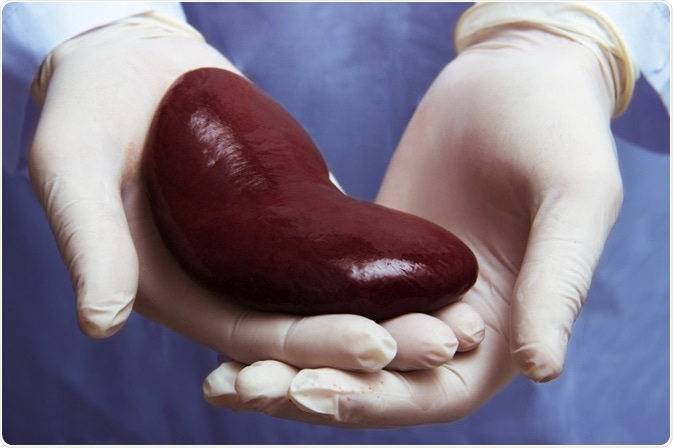A kidney transplant is often considered the best option for the treatment of patients with kidney failure. Such patients are first tested at transplant centers, both physically and mentally, together with an evaluation of their financial status to check whether they have the means to pay for their transplant.

Image Credit: Luuuusa/Shutterstock.com
Donors are also extensively tested for a variety of diseases. Formerly, a donor with hepatitis C could not even consider organ donation. Also, many people aren’t comfortable getting a kidney from a person with hepatitis C.
Hepatitis C
This infection is caused by the hepatitis C virus (HCV) and can be either acute or chronic. From 55% to 85% of patients develop chronic hepatitis C, and among these, up to a fifth will eventually develop cirrhosis within two decades. Equally concerning, it may cause cancer to develop in the damaged liver.
HCV infection is bloodborne and may be transmitted by blood transfusion (where unscreened blood and blood products are used), by shared needles, by the use of dirty needles and by sexual transmission where the individual comes into contact with the blood of the infected person.
There are about 71 million people with chronic hepatitis C and many of these will go on to develop cirrhosis or liver cancer.
In 2016, almost 400 000 people died of the disease and its complications, mostly for tumors in the liver and cirrhosis.
The problem is the low rate of diagnosis and treatment. No vaccine has yet been developed despite research efforts in this field.
The risk of hepatitis C in a kidney recipient
Formerly, the treatment of hepatitis C in a transplant patient was considered to be almost impossible, as it was based on interferon administration.
Not only it was associated with enhanced immunosuppression in these patients, but it could cause glomerulonephritis and acute graft rejection. However, nowadays transplant surgeons are reconsidering their approach in relation to this infection in the donors.
The reason lies in the advancement of medical treatment for hepatitis C. Antivirals that offer a cure in over 95% of cases are now available. These are called pan-genotypic direct-acting antivirals (DAAs).
Since the HCV genome does not become integrated with that of the host cell, (unlike the hepatitis B virus), there is no chance that the virus will persist in the transplanted tissues and reactivate later, once it has been eradicated using these drugs.
The outcome of the kidney transplant from an HCV-positive donor carries a 1.29 increased rate of mortality, but in real terms, this translates into a 1% greater chance of death at 1-year post-transplant and a 2% decline in 3-year survival. Either way, this is significantly better than the 10% mortality per year for patients with end-stage kidney disease who are on the waiting list for a transplant.
The first step
The initial relaxation of regulations had to do with recipients who were themselves hepatitis C positive.
These people might choose to receive a kidney from someone else with the infection, because such kidneys can be obtained much earlier than the traditionally screened uninfected ones. They can make such a choice today because of the availability of highly effective medications against this virus.
In these cases, the recipient will be treated with direct=acting antivirals against hepatitis C after the transplant.
Notwithstanding this approach, about 1000 healthy kidneys available for donation are discarded each year as unfit for transplantation because of the lack of recipients who already have hepatitis C.
The second step
Today, the kidney of a donor with HCV may be transplanted into someone who is free of thevirus, because of four reasons:
- people waiting for a kidney transplant are in better physical shape than those on long-term dialysis
- people waiting for a transplant are likely to get a kidney from a donor with hepatitis C much earlier
- the kidneys are usually very healthy in spite of the presence of HCV
- antivirals are available to cure the infection
Proof of concept studies
Several case reports show the feasibility and success of treating an infected donor with antivirals to the point of sustained virological response, or in other words, to the point of cure, and then transplanting the kidney to an uninfected recipient who is also treated for the infection.
A small study on 53 patients who have received such a kidney, shows that only one unexpected complication arose: a high level of BK virus, which is, however, common in transplanted kidneys and is treatable in most cases.
All the recipients automatically incurred and were successfully treated for hepatitis C after receiving the new kidneys. After 12 weeks of therapy there was no sign of the hepatitis C virus and they were considered cured.
None of these patients died, but, on the other hand, the researchers pointed out that 10% of the patients on long-term dialysis die each year.
With this background, the standard of care in the US for patients awaiting kidney transplants could be to include hepatitis C infected kidneys among those offered even to uninfected potential recipients, suggests one researcher.
Sources
- Who.int. (2019). Hepatitis C. https://www.who.int/news-room/fact-sheets/detail/hepatitis-c
- Kidneyfund.org. (2020). Hepatitis C and kidney transplants. www.kidneyfund.org/.../
- Kamalkiran M., Ravikiran V., Shashidhar C., Prasad K. V. R., and Yeldandi V. Kidney transplantation from a hepatitis C virus-positive donor to a hepatitis C virus-negative recipient. Indian Journal of Nephrology 2018 Nov-Dec: 28(6) 488-489. https://dx.doi.org/10.4103%2Fijn.IJN_267_17. https://www.ncbi.nlm.nih.gov/pmc/articles/PMC6309394/
- Veroux, M., Corona D., Sinagra, N., Giaquinta, A., Zerbo, D., Ekser, B., Giuffrida, G., Caglià, P., Gula, R., Ardita, V., and Veroux, P. World Journal of Gastroenterology 2014; 20(11): 2801–2809. Published online 2014 March 21. DOI: 10.3748/wjg.v20.i11.2801 https://www.ncbi.nlm.nih.gov/pmc/articles/PMC3961963/
- Miklos Z. et al. Transplantation of kidneys from hepatitis C–infected donors to hepatitis C–negative recipients: Single center experience. American Journal of Transplantation, 2019; DOI: 10.1111/ajt.15530
Further Reading
Last Updated: Mar 12, 2020